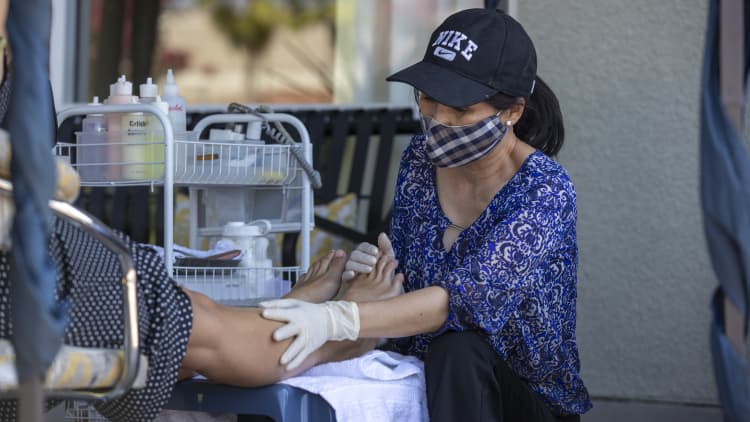Over the past 28 months, Feng "Franklin" Tao and his family have been driven to the cusp of bankruptcy as they try to prove he isn't a tech spy for the Chinese government.
In August 2019, FBI agents arrested Tao, a chemical engineering professor at the University of Kansas, on fraud charges, accusing him of failing to disclose his affiliation with a Chinese university. He has lost his job and, with a trial date scheduled for March, faces a possible prison sentence of 20 years.
Through his attorneys, Tao pleaded not guilty to all charges and contended that the FBI knowingly used false information from an informant to obtain search warrants.
"We live under constant fear that our family would be separated as a result of this injustice," said Tao's wife, Hong Peng.
She said the ordeal has taken a toll on the mental health of her teenage children, both of whom were born in the U.S. The legal defense fees, meanwhile, have almost reached $1 million. Peng, now the primary provider for her family, juggles three jobs and sometimes has to work 24-hour shifts as an ultrasound technician to make ends meet. Even though they have raised nearly $350,000 from GoFundMe, the Taos are still more than two months behind on payments.
Tao was the first of more than 20 academics of Chinese descent to be prosecuted under the China Initiative, a Trump-era national security program to address Chinese economic espionage — the theft of trade secrets to benefit a foreign government — in universities and research institutions. Over the past year, Asian American advocacy groups have increased pressure on the Biden administration to end the initiative, which they say unfairly targets ethnic Chinese scientists and brings emotional and financial harm to their families.
"The China Initiative impacts Americans, permanent residents, immigrants, international students and visiting scholars," said Gisela Kusakawa, a staff attorney for the civil rights group Asian Americans Advancing Justice, or AAAJ. "It's based on the premise that all scientists of Chinese descent or [who] have connections to China should be treated with suspicion."
More from NBC News
Nearly 90 percent of the 148 people charged under the China Initiative are ethnically Chinese, according to an investigation by MIT Technology Review. They include U.S. citizens, Chinese citizens and citizens of Hong Kong and Southeast Asia.
The Justice Department didn't respond to a request for comment. At a congressional hearing last month, Attorney General Merrick Garland said China represents "a serious threat with respect to espionage" and that Justice Department officials "never investigate or prosecute based on ethnic identity."
The racial profiling of scientists of Chinese origin, advocates say, stretches back more than a quarter-century, to the Economic Espionage Act of 1996, which sought to address economic espionage by foreign governments. Since 2009, a majority of defendants charged under the law have been people of Chinese heritage, according to a recent report from the advocacy group Committee of 100.
The China Initiative, despite its stated mission, hasn't found much success catching spies or countering technology theft. Only about a quarter of 77 cases include economic espionage charges, and fewer than one-third have resulted in convictions, according to the MIT Technology Review analysis. Since 2018, when the initiative launched, the FBI has brought 12 prosecutions at academic or grant-making institutions, none of which involved espionage charges.

On the other hand, the study found, there has been an increase of "grant fraud" cases centered on academics who fail to disclose financial ties to Chinese entities on grant application and conflict-of-interest forms — which is a federal requirement. Because the U.S. has historically encouraged academic collaboration with China, experts say, reporting policies aren't always clearly communicated to university scientists.
Anming Hu, a professor and nanotechnology expert at the University of Tennessee, was put under house arrest for 18 months for failing to disclose income he had received from a Chinese university. Hu, however, claimed that the University of Tennessee asked him to disclose income in excess of $10,000; he made only $3,000 from lectures in China. In September, a federal judge acquitted him on all counts, concluding that there was no evidence of fraud.
A year ago, AAAJ launched the Anti-Racial Profiling Project to persuade lawmakers to end the China Initiative and assist people targeted by the Justice Department. The group has provided legal and advocacy support to more than 70 academics, many of whom lost their jobs.
Kusakawa, who leads the project, said many targeted scientists have lived in the U.S. for decades and have made it their home. Being under prosecution renders them unemployable and jeopardizes their immigration status. Some weren't able to find work again even after their charges were dropped.
Thu Nguyen, the executive director of OCA-Asian Pacific American Advocates, a nonprofit advocacy group, said the program has created a climate of fear that could trigger a brain drain in academia. The growing threat of racial profiling in the U.S., she said, has already pushed some talented scientists to look for jobs back in China.

According to a University of Arizona and Committee of 100 survey of nearly 2,000 scientists at 83 research institutions, 51 percent of ethnically Chinese scientists, including U.S. citizens, feel considerable fear or anxiety about being under surveillance by the US government. Just 12 percent of non-Chinese scientists share the sentiment.
"All this uproar about prosecuting 'spies' and anyone with ties to China causes fear in the community," Nguyen said. "Folks from Asia who may have wanted to come here aren't coming anymore because of all these government processes and background checks."
The China Initiative, she said, affects not only professors and working scientists but also students, many of whom may hesitate to apply for scholarships or pursue careers in science and technology out of fear of prosecution.
In recent months, OCA has been lobbying lawmakers to end the program. In November, the group visited senators and mobilized chapter members to speak out about the issues at legislative sessions.
Students and faculty members at some academic institutions have also stepped up support of their Asian and Asian American colleagues.
In January, after MIT professor Gang Chen was charged with grant fraud over allegations that he concealed ties to the Chinese government, 170 of his colleagues signed an open letter condemning the investigation as "deeply flawed and misleading." (MIT's president said the school handled grant funding and collaboration with China. Chen is fighting the charges.) Last month, New York University's graduate student union launched a petition in support of two tenured Asian professors in the medical school who are targeted by the initiative.
Meanwhile, Tao's family, who have lived in the U.S. for nearly two decades, are committed to clearing his name and fighting the case, which they consider an "injustice."
"We came here to chase the American dream," Peng said. "We don't want this to happen to any other family."
CORRECTION (Dec. 30, 2021, 1 p.m. ET): A previous version of this article misstated the source of a survey. It was conducted by the University of Arizona and Committee of 100.

